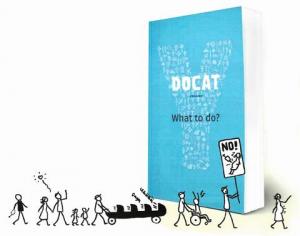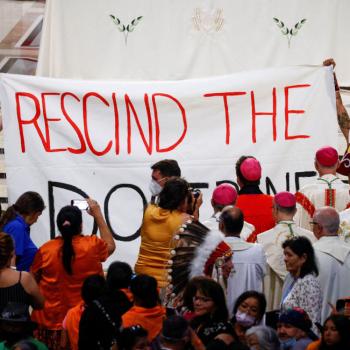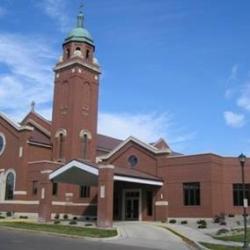Strong Challenges in Some Important Areas of Social Life

Pleased, excited. These name my reaction when the parish religious ed coordinator handed me a copy of DOCAT: What to Do? It’s a Catechism for young people on the social teaching of the Catholic Church. That’s a teaching about which Catholics, especially in Southern Minnesota, hear too little.
A chorus of praise met the release of Pope Francis’ gift to youth at the 2016 World Youth Day. That’s according to this review of the book. An accompanying app gets equal commendation here. A read-through of the text allows me to add my own praise and some criticism, too, which I’ll save for a future post.
I’ll mention one fault, as I see it, right away simply because it struck me on first opening the book. For an important instruction aimed at a young – and busy – audience, it’s very long. The book is small enough and very attractive, but fairly small print in the central text and even smaller in the interesting sidebars make for a lot of words. I wonder which high schoolers or college goers are going to read this book. I hope they do.
On to the strengths of DOCAT
There’s a lot of good, challenging content in this book. I had feared that I would find a lot of safe soundbites and generalities, but, in fact, the book packs a strong punch on some controversial subjects. In true Catholic fashion, it tries to make everyone, whether on the right or the left, uncomfortable.
The range of topics was quite a bit larger than I expected. That accounts partly for the excessive length. Two introductory chapters specify among other things:
- That it’s all about God’s love;
- That salvation is for the body as well as the spirit, for history as well as heaven, for communities as well as individuals;
- That the Church has a social doctrine because human beings are not just individuals; they are also social beings;
- That the Church does not replace the state and politics but encourages members to become involved in both in order to correct society’s unjust structures.
Two things impressed me about these introductory chapters. They were very strong on social sin. Without using that term this part signals what turns out to be the book’s lasting concern with unjust structures. They are society’s ways that pass unnoticed by the comfortable in prosperous countries. Over and over we read how economic structures that we pay so little attention to work against the poor.
Following chapters cover topics related to:
- The person
- The principles of the Church’s social teaching
- The family
- Work
- Economic life
- Political life
- The international community
- The environment
- Peace and violence
Every chapter includes a section of extended quotes from Church documents on social justice from Leo XII’s Rerum Novarum to Pope Francis’ Laudato Si. Docat concludes with a chapter on personal and societal commitment. Sidebars on every page present relevant quotes from religious and secular figures.
Strong messages on economics
On almost any topic the authors find a connection to economics and poverty. They constantly nudge the potentially complacent reader out of any comfort zone of individual self-satisfaction. Even when the chapter’s topic is simply the person, we are reminded of the horrors visited by Europeans on the indigenous American peoples and of the economic, social, political, and, in general, structural causes of poverty today. (Sidebars on pages 62 and 63)
The authors list the four usual principles of Catholic social teaching: the dignity of the human person, the common good, subsidiarity, and solidarity. Before long, though, they have added a fifth — sustainability. This comes in the context of the discussion of private property. Ownership is permitted, but earth’s goods are intended for all, including future generations. Interestingly, this comes even before the discussion on the environment has begun.
The principles of subsidiarity and solidarity specify the venues at which to pursue solutions to problems. Subsidiarity encourages solutions at the smallest, most local levels. Solidarity extends to larger and larger groups, where there must be solutions to problems that local communities can’t handle. Before both of these, as if to keep the various interests involved on the right track, the authors insist on a “preferential option for the poor.” (##94-103)
The chapter on economic life, welfare and justice for all clearly states the Church’s ambivalence toward all economic systems, including capitalism. Markets must serve all people or they are not just. (#161) The market economy, though it has proved to be very efficient, must be subordinate to the constitutional state. Governments must provide clear rules and make provisions for those without jobs or money. (#160)
Challenges to the American way: Work, family, peace
There’s plenty in the DOCAT that American readers especially would do well to heed:
- Workers should be participants in decisions about their work experience. (#145) There is a “moral” right to work. (#148) Wages should ensure a family’s livelihood, and employers, unions, and government should work together to create flexible employment models to benefit families. (#149)
- No one has a right to decide whether another human life is worth living. Abortion and euthanasia are both contrary to God’s and the moral law. The same sensitivity that we owe to our endangered natural world should inspire the protection for the most vulnerable of us. (##71-79)
- Of course, the Church is in favor of peace. The authors of DOCAT are more specific. They challenge the logic of weapons manufacture and trade:
Any excessive accumulation of weapons and universal trade in them are morally unjustifiable. (#295)
- And they challenge the mechanism of fear that nations have relied on to prevent World War III:
The Church expressly rejects the so-called ‘logic of deterrence.’ The indiscriminate destruction of cities, countries, and populations through biological, chemical, or nuclear weapons of mass destruction is a serious crime against God and humanity. (#296)
And on the issue that practically consumes me: ecology
- The Church’s recent concern for the environment shows up well in DOCAT. An example is this quote from Pope Benedict XVI:
[T]echnologically advanced societies must be prepared to encourage more sober life-styles, while reducing their energy consumption and improving its efficiency. At the same time there is a need to encourage research into, and utilization of, forms of energy with lower impact on the environment and a worldwide redistribution of energy resources, so that countries lacking those resources can have access to them. (p. 248, “Message for World Day of Peace” 2010)
- And these from Pope Francis:
We have not yet managed to adopt a circular model of production capable of preserving resources for present and future generations, while limiting as much as possible the use of non-renewable resources, moderating their consumption, maximizing their efficient use, reusing and recycling them. (p. 238, Laudato Si 22)
Both everyday experience and scientific research show that the gravest effects of all attacks on the enbvironment are suffered by the poorest. (p. 241, Laudato Si 48)
- The only kind of prosperity that Christians can advocate is one that “uses resources sparingly and thoughtfully—in other words, that does not keep gobbling up the earth’s finite resources….” (#268, italics in original)
The English edition (but I suppose not the original German) has a strong message from the American bishops on climate change. (p. 248-49) And the authors give Jimmy Carter a concluding and sobering word:
We must face the prospect of changing our basic ways of living. This change will either be made on our own initiative in a planned and rational way, or forced on us with chaos and suffering by the inexorable laws of nature. (p. 247, a 1976 speech)
Personal and social commitment
A final chapter addresses some specifics of personal “love in action.” It speaks of involvement as Christians in both Christian and secular movements to address social evils. There are movements, especially political parties, that agree with some but not all of the Church’s positions. Here the position of DOCAT is somewhat confusing, if not overly strong. On political parties that, of course, don’t agree 100 percent with the Church, active participation is approved, but
The prerequisite for responsible involvement is a fundamental recognition by the party of inviolable human dignity, of human rights, personhood, and the defense of innocent human life at all stages of its development and in all conditions of dependence, of marriage as a union of a man and a woman…. (#319)
This seems to forbid membership in the Democratic Party of the United States. But then,
Belonging to Jesus means no professional, financial, economic, or political collaboration with criminal organizations … governmental systems of injustice, or businesses that destroy the environment, violate human dignity (sub-living wages, sickening workplace conditions, child labor), harass and persecute the Church, manufacture weapons of mass destruction, or ruthlessly pursue profits with no care about social consequences. (#321)
I think probably a majority of Americans would find themselves on the wrong side of one or more of those limits. Some of these are areas where the Church lines up closer to Democrats than Republicans.
We live in an imperfect world, where choices are hardly ever all right and often not all wrong either. One message of DOCAT throughout is that social justice is not easy. The document does give important guidance. It has some weaknesses as well, but that is a subject for a future post.
Image credit: Catholic Shoppe USA











